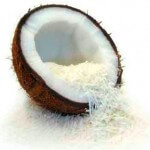 Coconut flour is a flour made from coconut solids that have been ground into a very fine powder. It has a mild coconut scent and flavor, which makes it suitable for flour-based recipes that don’t have other strongly-flavored ingredients such as cocoa powder or spices. It is also quite light and airy, making it especially suitable for baked goods like muffins, pancakes, and cakes.
Coconut flour is a flour made from coconut solids that have been ground into a very fine powder. It has a mild coconut scent and flavor, which makes it suitable for flour-based recipes that don’t have other strongly-flavored ingredients such as cocoa powder or spices. It is also quite light and airy, making it especially suitable for baked goods like muffins, pancakes, and cakes.
The reputation of coconut flour is growing in the West due to its considerable health benefits, which far exceed those of processed flours. Below is a list of reasons why health-conscious individuals are beginning to take coconut flour seriously, and why an increasing number of books specializing in coconut flour recipes are being published every year.
List of Health Benefits
Gluten-free – Arguably coconut flour’s biggest attraction is its gluten-free status, meaning it contains none of the gluten protein molecules found in grains such as wheat, rye, and barley. Gluten is highly allergenic and can even be deadly for people with Celiac disease (a condition where gluten damages the lining of the small intestine and prevents it from absorbing nutrients in food). However, growing evidence – particularly that compiled by Dr. William Davis in his groundbreaking book, Wheat Belly – suggests that gluten is unhealthy for everyone, and is a leading cause of lethargy, bloating, brain fog, and more. Fortunately, gluten-free diets are becoming much easier to adopt thanks to the growing availability of gluten-free flours like coconut flour.
Rich in dietary fiber – According to a study published in Innovative Food Science & Emerging Technologies in December 2006, adding coconut flour to our diets can significantly reduce our risk of developing heart disease, lower our cholesterol levels, and guard us from cancer and diabetes. The researchers, based in the Food and Nutrition Research Institute in the Philippines, claim that these benefits stem from coconut flour’s unusually high levels of dietary fiber (one hundreds grams of it contain a whopping 39 grams of fiber, which is almost double that of wheat bran). Dr. Bruce Fife, a naturopathic physician and the author of the book, Cooking with Coconut Flour, claims that coconut flour can help adults reach their recommended daily fiber intake of between 20 and 35 grams. He recommends adding one or two tablespoons of coconut flour to gravies, baked goods, casseroles, or smoothies.
High in beneficial fats – Since it is derived from coconut solids, coconut flour retains a large number of those fats for which coconuts are so beloved by health enthusiasts. One hundred grams of coconut flour contain 8.7 grams of fat, of which 8 grams are saturated. Most of these fats are medium-chain triglycerides (MCTs) – essential protective fats with noted antiviral, antimicrobial, and antifungal properties. MCTs have also been shown to boost the metabolism, making coconut flour suitable for weight loss diets.
Safe for diabetics – Because it is high in fiber yet relatively low in digestible carbohydrates compared to processed flours, coconut flour has a gentle impact upon blood sugar levels. This makes it an excellent flour for diabetics, prediabetics, and anyone else who wants to avoid blood sugar spikes.
Packed with protein – Though it is free from gluten proteins, coconut flour contains an impressive number of other proteins. In fact, one hundred grams of coconut flour contain 19.3 grams of protein, or 38 percent of our recommended daily intake – far more protein per serving than other leading flours such as white, cornmeal, or rye. Consequently, coconut flour is a valuable cooking ingredient for vegan or vegetarian bodybuilders since protein is, of course, needed for cell repair and growth.






